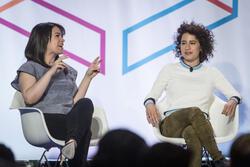Second Season with Crazy
I started watching Crazy Ex-Girlfriend during the long days of summer. I had seen earlier videos by Rachel Bloom, the creator and star of CEG, including a “Santa Baby” parody for Hanukkah and her interpretation of a bar mitzvah student’s day dream. I pressed “play” hoping her television show would bring the same well-produced music videos and irreverence about stereotypes––especially stereotypes of Jewish women. The first season surpassed my expectations. I quickly came to love CEG because Rebecca Bunch, the titular “crazy ex-girlfriend,” is a complex individual, not a caricature. The show’s creators handle sensitive issues of depression and anxiety with nuance and sympathy. It is wonderful to see the universal story of love and searching for acceptance through a Jewish feminist lens and to watch this very lovable and very human community of characters move toward self-awareness.
As CEG returns for a second season, the tone has shifted. When I watched the first episodes of this new season, I was a little worried. In the first episode, Rebecca gaslights Josh when he expresses concern that she moved to West Covina for him. After all her growth in Season One, it felt unsettling to watch her call another character crazy as she tries to trick him into moving in with her, with his own dresser drawer that plays a song by Scott Joplin when opened. The characters around her have begun to deal with troubling patterns and to make changes in their own lives, but Rebecca doesn’t yet seem to realize that her single-minded pursuit of Josh has been the source of many of her problems.
CEG’s new theme song underscores Rebecca’s change between the two seasons. In the first season, the theme song decried “crazy ex-girlfriend” as a “sexist term” and asserted that “the situation is a lot more nuanced” than Rebecca simply coming to California because she was “so broken inside.” For a snappy 40-second intro, this theme song did an excellent job of puncturing stereotypes and essentializing terms that can erase complex issues (like mental illness and sexism). In Season Two, the new theme song, “I’m Just a Girl in Love,” will introduce each episode. As the chorus dancers chastise Rebecca’s would-be detractors with lines like “when you call her crazy / you’re just calling her in love,” it seems that the ground she gained in the first season has been lost. The new theme song uses “crazy” liberally and uncritically (maybe “ex-girlfriend in love” doesn’t have quite the same ring).
If Rebecca is still living largely in denial, other characters have started to acknowledge the crazy in their own lives. During a month away from his friends, Greg began attending Alcoholics Anonymous meetings, a fact Rebecca learned while she and Paula, her coworker and confidant, scheme together for the last time. Like Greg with his drinking, Paula describes the excitement she gets from snooping with Rebecca as “glitter exploding inside.” We have heard this phrase before: it is exactly what Rebecca said in the pilot episode about how Josh makes her feel. While Rebecca may be slipping deeper into her “addiction” to Josh, Paula and Greg are learning how to not let the glitter blind them to the consequences of their actions.
Things started clicking for me when I watched the second episode of the new season. It becomes clear that Rebecca’s pursuit of her addiction (Josh) could imperil Greg and Paula’s progress, as her machinations kick glitter back in their faces. With its trademark blend of humor, sympathy, and catchy musical numbers, the show demonstrates what is at stake for Paula, as other dreams have “pooped on [her] face,” and for Greg, as he looks back on his drunken antics. These songs capture dark feelings of being beaten down, by alcoholism for Greg, or by the sacrifice of being a wife and mother for Paula, without brushing them off as simple plot lines to be resolved. In order for this to work, as a viewer I have to put my trust in the show and its creators, which does make me nervous. Instead of writing Paula’s recommendation for law school, Rebecca trains intensely for a night out with Josh at a ping pong bar. Greg fails to show up for an AA meeting after finding out about Josh and Rebecca. Rebecca’s behavior during this episode could have confirmed my worst suspicions, especially if she continued acting only out of concern for Josh as she did in the first episode. Instead, she admits to Paula and Greg how she has failed to stand behind them as a friend, which reassured me that she would not continue the worrying behavior from the previous episode. Understanding how her focus on Josh has hurt her friends, Rebecca finally realizes how crucial her support is, for their changes and her own.
As the characters grow and change, there is something important happening with this love story. The show has challenged cliched portrayals of Jewish women and Asian-American men, especially when they interact as romantic interests. In the second episode of the new season, Rebecca tells Josh how “Bubbe would have hated” him. “She was really racist,” she says, “it was a different time, but still wrong.” Even if the time has passed when such hate would be expressed openly, there are still ways in which discussions about Jewish continuity and intermarriage reflect bias against non-Jews and Jews of color who do not fit into the stereotypical Jewish-American (often meaning Ashkenazi) experience. As Rebecca presents Josh with noodle kugel and introduces it as “a Jewish thing,” the creators of the show continue to feed us the universal story of love and acceptance with the particular flavors that made the first season so great.








